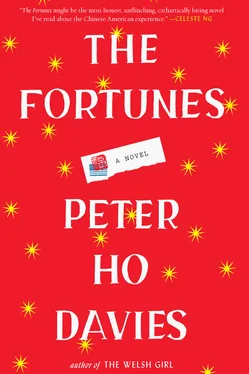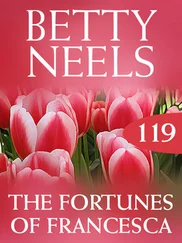She wants him to shut up, he realizes a moment after he says, “But this isn’t Mei Mei. This isn’t the girl in the photograph.” He pulls it out to make sure, stuffs the envelope of cash back in the same pocket. There’s a birthmark, a small mole on her temple. A beauty spot, they’d called it to each other. He peers hard at the photo, trying to determine if it’s a blemish, but then all at once everything else is wrong — the set of the mouth, the nose. They’re already trying to tell him — the director, even Napoleon — that the photo is old, that babies change, but he can see that putting the envelope of money back in his pocket has given him the upper hand here. “It’s not, is it?” He looks at Nola and she nods infinitesimally.
Outside the director’s window night has fallen, and he can see them all reflected in the dark glass as if on a screen. On her desk John sees a paper surgical mask, still bowed to the shape of the director’s face, with a smudge of lipstick in its middle.
“Where’s Mei Mei?” he asks. “It’s all right if she’s sick. We want to see her. We’ll wait until she gets better. It’s all right.”
But even as he says it, he knows it isn’t. The director and Napoleon have a hurried exchange. John has never yearned so much to speak Chinese.
“Baby die,” Napoleon whispers at last, looking stricken, and he nods, over and over, of course, of course. Baby die. Babies die all the time. It’s the most natural thing in the world.
Beside him, Nola’s eyes are closed so tight the tears seem squeezed from them.
“When?” John says.
“This morning.” While he was out walking, he thinks. Or while everyone else was celebrating? While he was sitting in Starlucks? He always thought those copycat joints made the Chinese seem like flatterers or fools unable to tell the difference. Now he wonders if they’re not mockery, if the Chinese aren’t in on the joke. But the deception is the least of it. Poor, poor Mei, he despairs, not so lucky after all. He never met her, yet he feels like he’s in mourning, so much so that what Nola says next doesn’t surprise him, though Napoleon’s and the director’s faces fall in shock.
“I want to see her.”
There’s a hurried, tumbling conversation in Chinese.
“It won’t do any good,” Napoleon begins.
“I want to see her.”
“Is the truth,” Napoleon assures them, and he believes her, even though he knows she’s tried to pass off the new baby as Mei.
“That’s not why,” he tells her. He looks at the director. “Please, let us see her.”
He knows they want him to take the other baby. He knows they want to keep this quiet. He knows they want his money. He knows they’ll allow it.
And they do. The baby in Nola’s stiff arms is passed to the director, who passes her to a nurse. They’re led into the basement, down a long corridor, bare pipes overhead. They pass an open door through which they glimpse huge washing machines, a line of dryers, their windows like a row of portholes on a submarine, and, dwarfed by the equipment, a group of toddlers folding laundry. Tiny shirts and pants. John thinks of little Lily.
At the end of the hall there’s a small office, a doctor’s, judging from the posters tacked to the walls, and beyond it a bare examining room. Everywhere in China is chilly, he’s found (they’re here off-season), but the room is frigid — not refrigerated but naturally cold, like a pantry, or a root cellar, or the grave, of course. He folds his arms, tucks his hands under the cuffs of his rolled shirtsleeves for warmth.
At the threshold Nola puts a hand on Napoleon’s arm, shakes her head, and the guide nods, visibly relieved, stands outside, her back to the door, as if on guard.
Mei is bundled up on a metal desk that doubles as an examination table, and John’s immediate feeling is how hard the surface looks, how drab and colorless compared to all the cribs he’s ever seen. And then he notices her stillness. He’s been around sleeping babies before — the children of friends — but the quality of this stillness is different. And then he sees it’s not the baby — or not only — but also the adults. Normally we creep around a sleeping baby, hushed, gentle, slow, breath held. Now the director moves brusquely, jaggedly, her feet scraping the floor, not fearful of waking the baby, eager if anything to make a little noise, to affirm her own life. John makes himself inhale, exhale.
A cloth is raised. They look at her face, already faded to gray, as matte as the photo they’ve cherished. Her mole is a dark period at her temple. He imagines the life draining from it as from a hole.
It comes to him that all this time, all this ambivalence on his part was a kind of fear of this tiny baby, that somehow she would make him less real, less authentic, and he bows his head, begs for her forgiveness.
“Okay,” Nola says with a swallow, and John puts his arm around her quickly to steady her, leads her out and up the rough concrete stairs, away from what he can’t help thinking of as the death floor.
Back in the director’s office, slumped in low chairs, more Chinese flits over their heads. John has the toy elephant in his hand — no idea when he took it out, how long he’s been gripping it. He remembers, absently, the huge elephant statues at the Ming tombs outside Beijing, Napoleon explaining that they were carved before elephants became extinct in China, in the fifteenth century. When he looks up, Napoleon is studying them carefully.
“You must decide, John, Nola. I’m so, so sorry. But will you take the other baby? The director says she’s the very best they have. Strong, healthy. And you can have her for less.” Napoleon bows her head, tucks a string of hair behind her ear. “She is desperate. If you don’t take, there will be questions, trouble for her, I think.” And for you? John reflects. Is this your Waterloo? If you lose your job, will you be able to afford a child? .
He appraises these two women who are trying to sell him a baby girl. He hasn’t seen a man since he entered the orphanage.
The director says something else in an undertone.
“Come,” Napoleon says gently. “Spend some time with her.”
There is something indecent in all this, but when John looks at Nola, he knows she feels it too. We have the diapers, he wants to say. What else are we going to do? So they go along.
And in her eager panic the director ushers them into the ward.
The thick smell first — the cheap scent of wipes and talc and cleaning fluid — then the sound, almost industrial, like a factory floor, until he can begin to process the uproar of crying with, beneath the wails, an uneven, juddering beat — it takes John a further moment to identify it — of children pulling on crib bars, jumping on mattresses. The cribs are made of a black tubular metal — hence the industrial clamor — and he can’t help but think of cages, of cells. When he makes himself banish that thought, the place reminds him of an old maternity ward, all the babies lined up, with perhaps a cigar-smoking dad peering in at them from behind a window, trying to identify his. Only here there’s no glass between.
“Here.”
The director is holding out the baby to them. John stares at it, making sure it’s the same one as before. Its legs are kicking, its face contorted, and for a moment, overwhelmed by the noise, put off by the aggression with which the director pushes the baby at them, both he and Nola freeze. And then Nola takes her into her arms.
The woman calls out in Chinese, and Napoleon, after a brief consultation, whispers tightly, “If you no like this one, she says… you can choose. See the others. Take any you want!”
She gestures to the row after row of babies. Another one in half an hour. John can suddenly understand why Stan and Bev have come back for a second child. “Like Chinese takeout,” Stan had joked. It had seemed crass before, but John gets it now. What will become of all these children? How can they save only one?
Читать дальше












